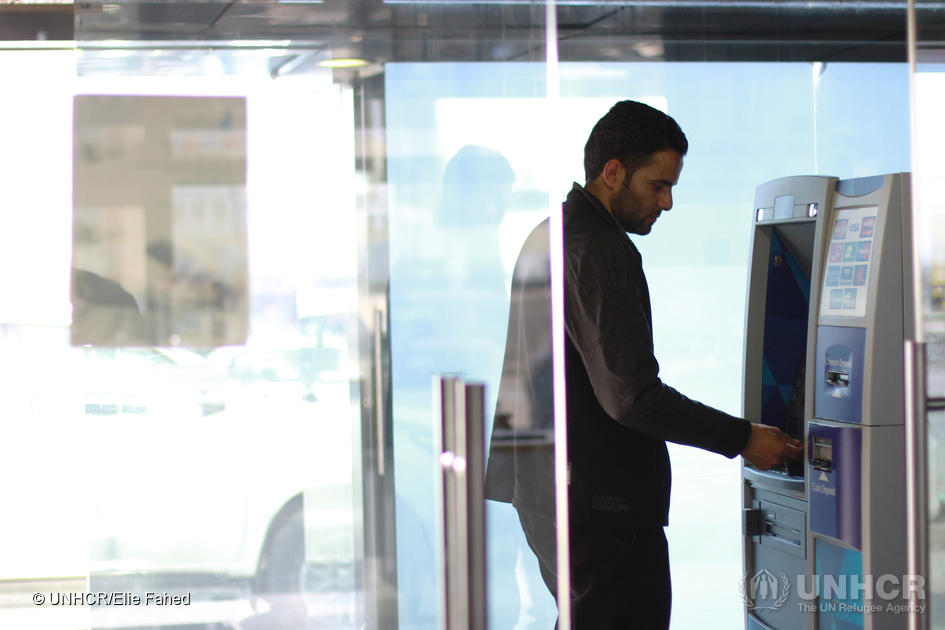الإدماج المالي للاجئين
الإدماج المالي للاجئين
تعمل المفوضية على تعزيز وزيادة فرص الوصول إلى الخدمات المالية للاجئين وغيرهم من الفئات الأكثر ضعفاً في المجتمعات المضيفة.

ليس بإمكان العديد من اللاجئين الوصول إلى البنوك وغيرها من الخدمات المالية الرئيسية، وهو ما يتسبب بعقبات هائلة في طريقهم إلى الاعتماد على الذات والاستقلال الاقتصادي. إذ من دون وجود حساب مصرفي، فإنهم يفتقرون إلى مكان آمن لحفظ الأموال فيه وتلقيها، ولديهم خيارات أقل بكثير للتسديد أو الحصول على القروض. باختصار، فإنه بدون هذه الخدمات، لا يمكنهم المشاركة بشكل كامل في اقتصاد أي بلد أو بناء حياة مستقرة لأنفسهم ولأسرهم.
تعمل المفوضية على تعزيز إمكانية الوصول إلى الخدمات المالية للاجئين وغيرهم من الفئات الضعيفة في المجتمعات المضيفة. نحن نعمل على بناء الوعي بالإمكانيات التي تتمتع بها الأعمال التجارية في خدمة اللاجئين والتغلب على القيود المتعلقة بالسياسات وعوائق الوصول.
بالنسبة للاجئين وغيرهم من الأشخاص الذين تعنى بهم المفوضية، فإن التغيير المستمر موجود في كل مكان. وينطبق هذا أيضاً على وضعهم المالي: تتطور احتياجات اللاجئين المالية بمرور الوقت، اعتماداً على مرحلة نزوحهم، بدءًا من توفير النقد لتدبر أمورهم عند الوصول، وانتهاءًا بخدمات أكثر شمولاً مثل المدخرات والمدفوعات والائتمان خلال فترة أكثر استقراراً وأطول أمداً.
وفي ما بين هذه الأوضاع، قد تلعب عوامل أخرى كثيرة دورها أيضاً، على سبيل المثال، مستوى الضعف الذي وصلوا إليه، ورأسمالهم البشري والاجتماعي، وخططهم للمستقبل.
ما الذي تقوم به المفوضية؟
تعمل المفوضية على ضمان حصول اللاجئين، وكذلك الفئات الضعيفة من المجتمعات المضيفة، على خدمات مالية مناسبة وبأسعار معقولة، وأن يقدم مزودو الخدمات المالية مثل هذه الخدمات. كما نعمل على بناء الوعي بإمكانيات الأعمال التجارية في خدمة اللاجئين والتغلب على القيود التي تفرضها السياسات والتي تعيق وصول اللاجئين إلى الخدمات المالية.
لتوفير وتعزيز بيئة تتاح فيها للاجئين مجموعة مختارة من الخدمات المالية القائمة، أبرمنا شراكات مع مجموعة من المؤسسات المالية التنموية ومزودي الخدمات المالية والمستثمرين في مجال المشاريع الصغيرة:
- بالتعاون مع الوكالة السويدية للتعاون الإنمائي الدولي ومؤسسة غرامين كريدي أغريكول، أطلقنا برنامجاً لتعزيز فرص الوصول إلى الخدمات المالية وغير المالية للاجئين والمجتمعات المضيفة في أوغندا. يوفر البرنامج لمزودي الخدمات المالية المختارين تمويل الديون والدعم التقني، وذلك لتمكينهم من توسيع عمليات الإقراض الخاصة بهم والوصول إلى سبل التدريب على ريادة الأعمال والمعرفة المالية بالنسبة لأكثر من 100,000 لاجئ وآخرين من المجتمعات المضيفة، 75% منهم من النساء.
- نحن نتشارك مع منصة "كيفا" غير الربحية للتمويل الجماعي في عدد من البلدان، وذلك لتحفيز الإقراض للاجئين من خلال منح قروض التمويل الجماعي للاجئين والمجتمعات المضيفة لهم.
- بالتعاون مع صندوق الأمم المتحدة لتنمية رأس المال، فقد أنشأنا برنامجاً مشتركاً لدعم مزودي الخدمات المالية في إفريقيا بالمساعدة الفنية ودراسات السوق، وتمكينهم من تقديم خدمات مالية قائمة على الطلب وتركز على العملاء للاجئين والمجتمعات المضيفة.
- نحن نعمل مع مؤسسة تعميق القطاع المالي في إفريقيا للدعوة إلى توسيع نطاق الخدمات المالية لتشمل اللاجئين، وذلك من خلال مزودي الخدمات المالية في عدد من بلدان إفريقيا جنوب الصحراء الكبرى. حتى الآن، تدعم المؤسسة مزودي الخدمات المالية من خلال دراسات السوق والمساعدة الفنية في رواندا وأوغندا وجمهورية الكونغو الديمقراطية.
- نعمل بشكل مشترك مع مؤسسة التمويل الدولية ومنظمة العمل الدولية على تقييمات السوق في كينيا وفي ربط المرافق التقنية التي أنشأتها المنظمتان مع مزودي الخدمات المالية. كما نتشارك مع مؤسسة التمويل الدولية في أمريكا الجنوبية في مجال دراسات تقييم السوق.
- نحن نتشارك مع عدد من مزودي الخدمات المالية عبر البلدان من خلال تقديم الدعم اللوجستي لهم وتبادل البيانات الاجتماعية والاقتصادية لتسهيل وصولهم إلى اللاجئين وتقديم المساعدة لهم.

